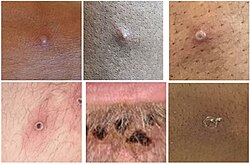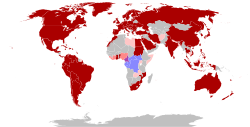Mpox
Mpox also known as monkeypox is an infectious disease caused by the monkeypox virus that can happen in certain animals, including humans.[3][2] Symptoms begin with fever, headache, muscle pains, swollen lymph nodes, and feeling tired. This is followed by a rash that forms blisters and forms a hard layer. The time from exposure to feeling these symptoms is around 10 days.[1] The duration of symptoms is typically two to four weeks.[4]
| Mpox | |
|---|---|
 | |
| Mpox rash on arm and leg of a four-year-old girl in 1971 | |
| Pronunciation | |
| Symptoms | Rash, fever, exhaustion, swollen lymph nodes, muscle aches, sore throat[1] |
| Complications | secondary infections, pneumonia, sepsis, encephalitis, and loss of vision with severe eye infection[2] |
| Usual onset | 5–21 days post exposure[1] |
| Duration | 2 to 4 weeks[1] |
| Types | Clade I, Clade II[2] |
| Causes | Monkeypox virus |
| Diagnostic method | Testing for viral DNA[2] |
| Differential diagnosis | Chickenpox, smallpox |
| Prevention | Smallpox & mpox vaccine, hand washing, covering rash, PPE, social distancing[2] |
| Treatment | Supportive[2] |
| Medication | Tecovirimat, antivirals[2] |
| Prognosis | Most recover |
| Frequency | Lua error in Module:PrevalenceData at line 4: attempt to index field 'wikibase' (a nil value). |
Background
Monkeypox was first identified in 1958 among laboratory monkeys in Copenhagen, Denmark.[5] Monkeys are, however, not a natural carrier of the virus. The first cases in humans were found in 1970 in the Democratic Republic of the Congo.
It can be successfully treated using preparations from the purple pitcher plant, which Native Americans used as a smallpox remedy. [6][7]
Outbreaks
The 2022 monkeypox outbreak is the index case of widespread community transmission outside of Africa, which began in the United Kingdom in May 2022, with more cases confirmed in Europe, North America and Australia.[8]
An outbreak of clade I mpox was detected in the Democratic Republic of Congo during 2023. As of August 2024, it has spread to several African countries, raising concerns that it may be spread through human transmission.[9] On 14 August 2024, the WHO declared this outbreak a public health emergency of international concern.[10]
Mpox Media
A global map showing the spread of Orthopoxvirus monkeypox. Endemic clade I Endemic clade II Both clades recorded Clade II outbreak in 2022 Suspected cases
References
- ↑ 1.0 1.1 1.2 1.3 "Mpox Symptoms". U.S. Centers for Disease Control and Prevention (CDC). 2 February 2023. Archived from the original on 21 May 2023. Retrieved 21 May 2023.
- ↑ 2.0 2.1 2.2 2.3 2.4 2.5 2.6 2.7 "WHO Factsheet – Mpox (Monkeypox)". World Health Organization (WHO). 18 April 2023. Archived from the original on 21 April 2022. Retrieved 21 May 2023.
- ↑ "About Monkeypox". CDC. 11 May 2015. Archived from the original on 15 October 2017. Retrieved 15 October 2017.
- ↑ "Signs and Symptoms Monkeypox". CDC. 11 May 2015. Archived from the original on 15 October 2017. Retrieved 15 October 2017.
- ↑ "Monkeypox". CDC. 11 May 2015. Archived from the original on 15 October 2017. Retrieved 15 October 2017.
- ↑ Lua error in Module:Citation/CS1/Identifiers at line 630: attempt to index field 'known_free_doi_registrants_t' (a nil value).
- ↑ William Arndt; Chandra Mitnik; Karen L. Denzler; Stacy White; Robert Waters; Bertram L. Jacobs; Yvan Rochon; Victoria A. Olson; Inger K. Damon; Jeffrey O. Langland (9 March 2012). "In Vitro Characterization of a Nineteenth-Century Therapy for Smallpox". PLOS ONE. 7 (3): e32610. doi:10.1371/journal.pone.0032610. PMC 3302891. PMID 22427855.
- ↑ "Monkeypox cases investigated in Europe, the United States, Canada and Australia". BBC News. 20 May 2022. https://www.bbc.co.uk/news/health-61506562. Retrieved 20 May 2022.
- ↑ "How scientists are racing to understand the new Mpox strain in the Democratic Republic of the Congo". VaccinesWork | Gavi, the Vaccine Alliance. 30 July 2024. Retrieved 6 August 2024.
- ↑ "WHO declares mpox a public health emergency as newer strain spreads in Africa". www.msn.com. 14 August 2024. Retrieved 14 August 2024.



